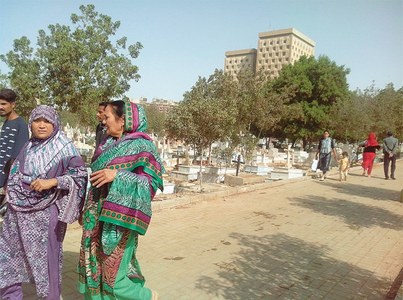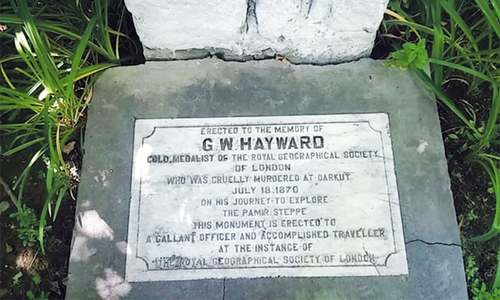Sitting under a lignum tree to avoid the midday broiling sun, Saeed Baqri told the history of the Karachi War Cemetery.
A few meters away, a gardener was busy watering the small trees and plants alongside the shallow graves aligned in long rows. Another was engaged in picking up fallen leaves from neatly levelled grassy ground.
“Their name liveth for evermore” reads a wall at the cemetery’s entrance. A huge white cross stands in the middle of the grounds which bifurcates the rows. All the headstones are of equal size and white.
Unlike other architectural sites in the country's commercial capital which are fast losing their shine not only through the ravages of time but also due to the neglect of their supposed benefactors and greed of land grabbers, this historic place is well protected and well maintained.
Located in the city’s eastern district and surrounded by military installations, the cemetery houses over 600 graves of fallen soldiers, mostly from the United Kingdom, who fought in World War II.
Apart from the graves, the cemetery also contains three monuments to commemorate the more than 25,000 servicemen of the forces of united India who died during the war and 568 men who served the Allied forces in garrisons and died in different areas (now called Pakistan) during World War I.
The cemetery is maintained by the U.K.-based Commonwealth War Graves Commission (CWGC), which also takes care of scores of war cemeteries across the globe.
The first grave a visitor encounters is that of Major K.B. Dawson from the 3rd Gurkha Rifles Regiment, who died on Dec 13, 1943 at the age of 29.
The region, now known as Pakistan, did not bear the direct brunt of the war, but its indirect involvement was huge. It had been declared a non-operational zone.
“Thousands of injured soldiers were brought to Karachi during World War II, which housed one of the largest camp hospitals in undivided India,” Baqri, who heads the CWGC’s Pakistan, Asia Pacific and Africa section, told Anadolu Agency.

“Those who died during the course of treatment were buried in a nearby open field.”
Following the end of World War II, he added, the CWGC, in line with other parts of the world, started building this cemetery, which was inaugurated by Pakistani President Iskander Mirza in 1951.
In addition to Karachi, the CWGC maintains a relatively smaller cemetery in the garrison city of Rawalpindi.
The commission has also identified 51 “abandoned sites” in northeastern Punjab province and northwestern Khyber Pakhtunkhwa province which house the graves of men who died during the two great wars.
“This is our policy that whenever it is possible, we will maintain these sites as well,” Baqri said.
Religious diversity
According to a plaque inscription, the Karachi cemetery houses 642 graves, including 525 British soldiers, and 109 men from undivided India.
All those buried in the cemetery were non-Muslims, as the Muslim soldiers were laid to rest in their own burial ground.
“Most of the buried here were Christians. That’s why you see a cross [erected] here”, Baqri said. “They also included Sikhs, Parsis and even Jews."
“There are the graves of six Jewish soldiers,” Baqri, who has been with the CWGC since 1983, said while pointing towards a section.

A record book placed at the entrance, however, contains the names of all the soldiers who died in the line of duty, including Muslims.
Baqri, who succeeded his father, who had served as the chief caretaker of the war cemeteries in the region from 1967 to 1983, recalled some myths about the graveyard in a lighter vein.
“There had been several myths about this graveyard involving ghosts and vampires until the 1990s.
“I've been living here for the last five decades. There was nothing like that. Myths are just myths,” he said with a smile.
Treasure
Apart from locals, the relatives and family members of the buried men also visit the cemetery.
Before the Sept 11, 2001 terrorist attacks in the United States, Baqri said that not only family members but also foreigners would visit the site in large numbers, but their numbers had significantly declined in recent years due to security reasons.
Arif Hassan, a Karachi-based architect, said the cemetery is an important part of Karachi’s history.
“Karachi played an important role in the two world wars as it served as a key supply route to the Eastern Front,” Hassan told Anadolu Agency.
“This war memorial sheds light on how and when Karachi was militarised by the British empire and what role this city played in the two world wars.”
Baqri treats the site as more than a graveyard.
“In the middle of the city, a well-protected Christian cemetery reflects the religious harmony in Pakistani society,” he said.
“I being a Muslim take it as an honour to look after this cemetery, which is an important part of the history of our region.
“I'm going to retire in the next few months. I will cherish my association with this site for the rest of my life.”














































